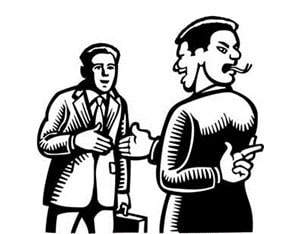|
My little children, let us not love in word, neither in tongue; but in deed and in truth. 1Jo. 3:18 The Greek word used most often in the NT for hypocrite is: hupokrites (5273) which Strong’s Dictionary defines as: “an actor under an assumed character (stage-player)…a dissembler”. The modern meaning of the word hypocrite comes from the world of Greek drama where the actors would use large interchangeable masks which they would hold in front of their faces, because a single actor would often play more than one role. Even today the theatrical arts are symbolized by the smiling and frowning masks of “Comedy and Tragedy”. Similarly, the ancient, biblical concept of hypocrisy was rooted in the carnal heart’s desire to conceal from others its true condition. The futility of trying to conceal the nakedness of the soul from God and those around us was aptly represented by the fig leaf aprons of the original pair Gen. 3:7. If these pitiful aprons, were given enough time, they would have naturally withered and vanished as they decomposed. Leaves in general –and fig leaves in particular—represent the empty verbiage that vainly attempts to mask man’s true condition. It was this public boasting without the corresponding fruit that brought the unusual curse of Jesus upon the fig tree Matt. 21:19.
It was not the season for ripe figs, except in certain localities… But in the orchard to which Jesus came, one tree appeared to be in advance of all the others. It was already covered with leaves. It is the nature of the fig tree that before the leaves open, the growing fruit appears. Therefore this tree in full leaf gave promise of well-developed fruit. But its appearance was deceptive. Upon searching its branches, from the lowest bough to the topmost twig, Jesus found ‘nothing but leaves.’ It was a mass of pretentious foliage, nothing more.” DA 581
The Gospel of the Old Testament condemned the sin of duplicity through its three dimensional symbols. Leslie Hardinge makes an interesting point concerning the preferred wood for the fires of the Brazen Altar. “The Mishna tells us... that the preferred wood was from the fig tree... The fig in the Bible is a symbol of self-righteousness, of hypocrisy, pretense; and when you read the gospel stories, you will discover that nothing burned up the Lamb of God so much as hypocrisy!” Shadows of His Sacrifice p. 35,36 Achan’s death sentence was not only for stealing but for dissembling Josh. 7:11. The crime which cost Ananias and Sapphira their lives was in presenting themselves as something that they were not Acts 5:1-11. But in lying to the church leaders and church members they were ultimately lying to the Holy Spirit (vs.3). The Bible employs many different expressions to describe and condemn the double-minded approach to life. Bible Descriptions of Hypocrisy Rev. 3:14,15 Lukewarm, neither hot nor cold Matt. 23:27,28 Beautiful on outside, unclean on inside Luke 9:62 Head facing one way, feet going another Matt. 15:8 Mouth drawing close to God, heart far away Hosea 7:8 Cake overcooked on one side, other side undone Matt. 7:3-5 Person focused on splinter in neighbor’s eye, when beam is in their own eye, obstructing vision Matt. 23:23 Particular about minor rules while ignoring important character traits Luke 13:10-16 Professing to be religious, but more concerned with temporal prosperity than human suffering Heaven’s distaste for misleading words was also encoded in the symbolism of the Holy Place. In the divine instructions given for the construction of the Candlestick, Moses was told to make it with an almond tree design which included knops (buds) flowers and almonds but significantly, there was no mention of leaves (Read Ex. 25:31-37). God’s message was clear. Speak with your actions far more than with your words 1Jo. 3:18. The “all-growth-and-fruit-but-no-leaf” motif, remains a powerful sermon against the two-faced religion which is commonplace in our day. In the challenging days in which we live, let us all be more concerned with removing the beam from our own eyes, than the splinter in the eyes of those around us. Let us focus intently and prayerfully on becoming all that Heaven wants us to become; then we will have no time to criticize and judge those around us. IF YOU WERE If you were busy being kind, Before you knew it, you would find You’d soon forget to think ‘twas true That someone was unkind to you. If you were busy being glad, And cheering people who are sad, Although your heart might ache a bit, You’d soon forget to notice it. If you were busy being good, And doing just the best you could, You’d not have time to blame some man Who’s doing just the best he can. If you were busy being right, You’d find yourself too busy quite To criticize your neighbor long Because he’s busy being wrong. Anonymous.
0 Comments
Leave a Reply. |
AuthorWrite something about yourself. No need to be fancy, just an overview. Categories
All
|
Copyright © 2023 Temple Restored Ministry



 RSS Feed
RSS Feed